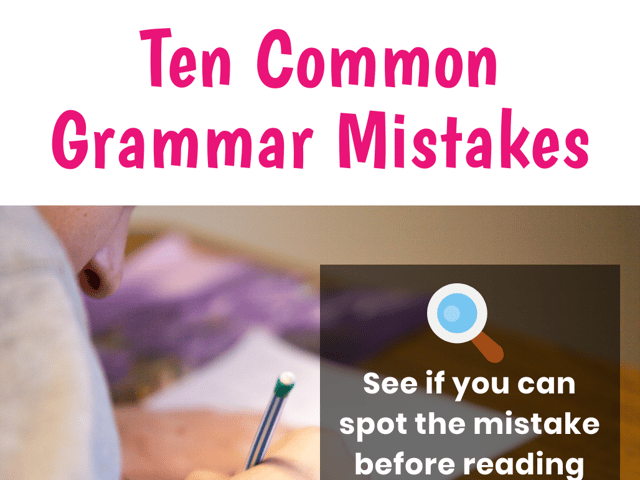
Ten Common Grammar Mistakes
Grammar mistakes abound in today’s world. Many of them are made in the rush to type, others because people simply don’t know (or remember to apply) the rules of grammar. Unfortunately, grammar mistakes can make a piece of writing seem less elevated, and these mistakes may also affect the intended meaning. So here are 10 grammar mistakes to be sure to avoid!
See if you can spot the mistake before reading the explanation for each.
1. I should of studied more!
Well, yes, if that studying was of grammar. If spoken, this sentence would sound correct, but, when written, it is horribly wrong. The word of is a preposition because it helps show the relationship between words in a sentence. For example:
“The hardest part of English is remembering all of the rules!”
In this sentence, the of shows the relationship between the hardest part and English. What the writer of “I should of studied more” was really trying to use was a helping verb—something to indicate what he or she ought to have done. In this case, studied more. The sentence, to be grammatically correct, should read:
“I should have studied more!”
Don’t misuse a preposition in place of a verb.
2. I’d rather complete the task with a group then do it by myself.
There is a big difference between making a comparison and marking the passage of time. But there are two words that are often misused in writing: then and than. When marking the passage of time or showing the steps in a series, then is the word to use:
“First you mix the butter and the sugar, then you add the flour.”
“I went to school, then I went to practice.”
But when you are making a comparison, such as saying you’d rather do one thing as opposed to another, the word to use is than so that the comparison is made clear to the reader. So the sentence for this mistake should be:
“I’d rather complete the task as a group than do it by myself.”
As it currently stands, the sentence makes it sound like this person is going to do the task twice: first with a group, then by him- or herself.
3. How you write effects how others perceive you.
Although they are pronounced similarly, affect and effect have very different meanings and misusing them can cause great confusion in your sentences. In the sentence example above, what the writer should have written is:
“How you write affects how others perceive you.”
That’s because affect is a verb, while effect is a noun. When there is a consequence or outcome, effect is the appropriate version to use. When there is an action happening, it affects which word you use. One way to remember the distinction is to look at the starting letter of each word. A capital A can be inverted to look like a V, which is the first letter of verb, or action, which also starts with an a.
“What is the effect of using the right word?”
It affects the reader’s ability to clearly understand the message.”
Now, the parts of speech for affect and effect are not always noun/verb, but they are most of the time, so it’s a pretty safe bet to use them as described above.
4. After all this grammar review, I need to lay down!
Well, that would be fine if you weren’t the person doing the action. In this case, lie is the word that should be used. Lay and lie are often used interchangeably, but they don’t actually mean the same thing, nor are they the same type of verb. When you lay something down, you are doing the action to an object—it’s a transitive verb, meaning that the action of lying is done by someone to something:
“Sally lay her backpack on the table.”
The intransitive verb lie means there is no transfer of the action—the doer is doing the action on his or her own.
“Mike decided to lie down under the tree.”
Think of it this way: when you place something somewhere, you lay it down. When you recline somewhere, you lie. Now, it does get a little tricky because if you change the tense of when the lying happens and it’s in the past, it is spelled lay, as in:
“Sam lay on the couch nursing a cold.”
If you tried to use past tense and said “Sam lied on the couch,” then you’d be suggesting that Sam wasn’t telling the truth on the couch. Isn’t grammar fun?
5. You’re kidding me! I’m never gonna remember all this.
It’s important to use words that are actually, well, words. While gonna is often how it’s pronounced, when you’re writing, it’s important to spell out or contract words correctly. In this case, going to. Other commonly miscontracted words include Ima rather than I’m or I am, ’cuz or ’cause instead of because.
Note that the word You’re is spelled correctly for the use here. Using the spelling Your would not be correct. We need the contraction form because the word means you are in this sentence.
6. This grammar review is making John and I hungry.
Pronouns: they’re tricky little things. And the personal pronouns of I and me can really cause a lot of problems. The easiest way to remember which to use in a given situation is to take anyone/everyone else out of the equation. In the sentence above, if John wasn’t around you wouldn’t say “This grammar review is making I hungry.” That wouldn’t sound right at all. Instead, you would choose the pronoun me, as in, “This grammar review is making me hungry.” To get all fancy about it, the pronoun I is used when the pronoun is the subject of the sentence and the one doing the action. If the person is the recipient of the action, the correct pronoun to use is usually me. Here are two correct examples:
Mom gave an allowance to my brother and me.
My sister and I got ready for school.
7. Its not okay to misuse apostrophes.
But it happens quite often, especially with that little word, it. Usually, when we think of using apostrophes, it’s to show possession or to create a contraction. Unfortunately, the rules change when it is involved.
When it has an apostrophe and an s (it’s), it can only be a contraction of it is.
The word it’s does not indicate possession.
To show possession with it, use its:
“The plant lost its leaves, but it’s going to be fine.”
8. Just because too or more words sound the same doesn’t mean your allowed to use them without knowing there purpose.
[There, they’re, and their], [two, to, and too], and [you’re and your] are groups of words that sound the same, but have very different meanings. They cannot be used interchangeably, as the spelling you use can totally affect the meaning of your sentence.
there = location (Look at the word—do you see the here in there? That indicates location—here, there, everywhere.)
they’re = contraction of they + are
their = shows possession (You can break this word apart, too. See their heir? The heir inherits their possessions.)
two = a number, one more than one (try visualizing the w forming 2 little ice cream cones, if that helps)
to = a preposition, often indicating direction or location (reminds us of the word go and is the shortest of these three)
too = in addition or also (See the extra “o” on the end? It wants to come, too!) or as used in “too many” (There are too many Os in there!)
your = belonging to you (The r is right next to you—it belongs to you.) you’re = contraction of you + are
9. This review of the rules of grammar have really helped.
Well, we’re not done quite yet. The sentence above has incorrect subject-verb agreement. When the subject and the verb in a sentence don’t agree in number or tense, the sentence can sound awkward and confusing. When the subject is singular, the verb must also be singular. When the subject is plural, the verb must be plural. In the case of the sentence at the beginning of this mistake, the subject of the sentence is review and the verb is have (really) helped. The problem is that the subject is singular (just one review) but the verb is plural. To correct:
“This review of the rules of grammar has really helped.”
Some sentences are going to get confusing, like when there is more than one subject.
“Sugar and water are the two ingredients in hummingbird food.”
Plural subject (sugar, water) needing plural verb (are). Or when there’s an or or nor used and both a singular and plural subject. In that case, the verb needs to agree with the subject that is closest to it. For example, these are both correct:
“Neither my brothers nor my dad likes seafood.”
“Neither my dad nor my brothers like seafood.”
In the second sentence, the plural subject is closer to the verb, so the verb should be plural.
10. There are alot more mistakes that could have made the list.
Our final mistake for this list is that all-too-commonly misused a lot. When you mean to indicate a large amount or quantity of something, you spell a lot as two words. Always. There is no such word as alot. There is a word allot, but that means to parcel out, assign, or allocate. For example,
“Each student is allotted 5 minutes for his or her presentation.”
but
“There are a lot more mistakes that could have made the list.”
Need some help?
These are just some of the more common grammar mistakes people make when writing. Review the rules for any of the mistakes that you didn’t identify when you read the lead sentence in each section, and be sure to take your time and choose your words carefully! For more help with English-related skills, check out our free English Basics Test practice and study guides. This material is not based on any actual test, but is just an overall review of English skills.

Keep Reading

ACT Blog
Essay Writing Practice and Prompts for the ACT
The ACT writing test is an optional exam, and is not always given as pa…

ACT Blog
How to Do Well on the ACT Essay
Understanding the ACT Essay Before diving into strategies to excel, it…

ACT Blog
How to Study for the ACT in One Week
Getting ready for American College Testing (the ACT) can be a source of…